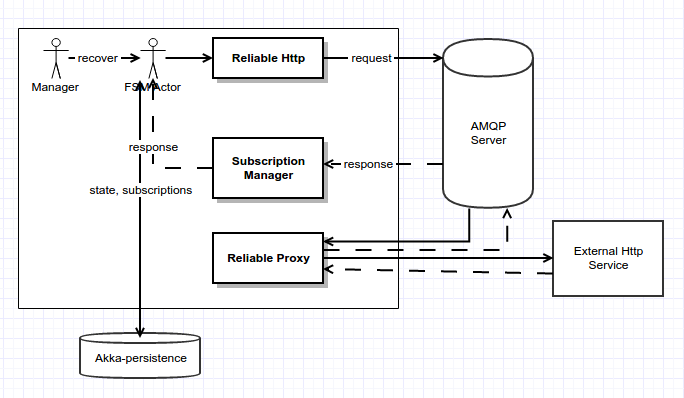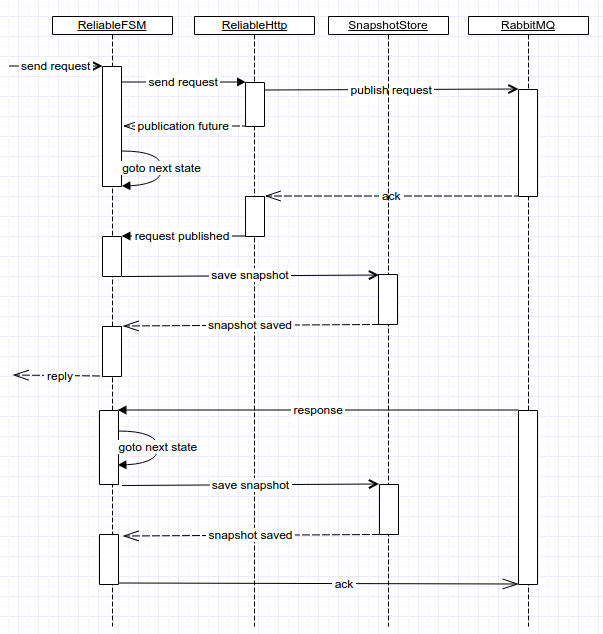Reliable Http Client is a set of tools making HTTP communication more reliable. It supports: at least one delivery guarantee as well as retry strategies including durable exponential backoff and dead letter queue.
It provides an abstraction layer over publisher/subscriber transport. Currently AMQP transport and Json4s serialization modules are implemented.
It can be used with any HTTP client. It includes a wrapper for Akka HTTP in a separate module, but it can be used with your own. In fact, it can be used even with any request/response client - not necessarily HTTP.
There are 3 basic usage scenarios:
- in-only: when responses are irrelevant -> You only care about requests being delivered.
- in-out: when You are interested in response but your response consumer is stateless
- in-out with subscriptions for responses: when You are interested in responses and your response consumer is stateful
For the third scenario there exists a provided module with persistent Akka FSM Actors (using akka-persistence) for easy recovery of subscriptions for responses.
If You only want to use Akka wrapper for amqp-client with Json4s serialization
libraryDependencies += "org.rhttpc" %% "rhttpc-amqp" % "0.9.0"
libraryDependencies += "org.rhttpc" %% "rhttpc-json4s" % "0.9.0"Then:
import akka.actor._
import rhttpc.transport.amqp._
import rhttpc.transport.json4s._
import rhttpc.transport.json4s.CommonFormats._
implicit val actorSystem = ActorSystem()
import actorSystem.dispatcher
AmqpConnectionFactory.connect(actorSystem).map { connection =>
val transport = AmqpTransport(connection)
val publisher = transport.publisher[String]("foo-queue")
publisher.publish("foo-message")
val subscriber = transport.subscriber[Int]("bar-queue", actorSystem.actorOf(Props(new Actor {
def receive: Receive = {
case i: Int => println(s"got: $i")
}
})))
subscriber.run()
}For clients with AMQP transport and Json4s serialization
libraryDependencies += "org.rhttpc" %% "rhttpc-amqp" % "0.9.0"
libraryDependencies += "org.rhttpc" %% "rhttpc-json4s" % "0.9.0"
libraryDependencies += "org.rhttpc" %% "rhttpc-client" % "0.9.0"import akka.actor._
import rhttpc.transport.amqp._
import rhttpc.transport.json4s._
import rhttpc.transport.json4s.CommonFormats._
import rhttpc.client._
implicit val actorSystem = ActorSystem()
import actorSystem.dispatcher
AmqpConnectionFactory.connect(actorSystem).map { implicit connection =>
val client = ReliableClientFactory().inOnly[String](ownClient.send)
client.send("foo")
}import akka.actor._
import rhttpc.transport.amqp._
import rhttpc.transport.json4s._
import rhttpc.transport.json4s.CommonFormats._
import rhttpc.client._
implicit val actorSystem = ActorSystem()
import actorSystem.dispatcher
AmqpConnectionFactory.connect(actorSystem).map { implicit connection =>
val client = ReliableClientFactory().inOut[String, String](
send = ownClient.send,
handleResponse = consumer.consume
)
client.send("foo")
}Consider the following situation:
system.actorOf(Props(new Actor {
def receive = {
case DoJob =>
httpClient.send(request) pipeTo self
case Response =>
// handle respone
}
}))When given actor is shutdown e.g. because of a system failure, the response message will never been delivered.
Thanks to rhttpc the same execution guarantees that after restart actor will receive the response message.
val rhttpc = ReliableHttpClientFactory().inOutWithSubscriptions(amqpConnection)
system.actorOf(Props(new Actor {
def receive = {
case DoJob =>
val request = HttpRequest().withUri("http://ws-host:port").withMethod(HttpMethods.POST).withEntity(msg)
rhttpc.send(request).toFuture pipeTo self
case Response =>
// handle respone
}
}))The example above causes requests/responses to be sent through AMQP durable queues. If http service is idle for a while and You need to restart your application - response messages will be delivered to response AMQP durable queue. But after restart your application won't know what to do with the response - in what state the sending actor was. So You also need to persist the state of your actor which includes acknowledged published requests. It can be achieved with ReliableFSM delivered by this project.
val rhttpc = ReliableHttpClientFactory().inOutWithSubscriptions(amqpConnection)
system.actorOf(Props(new FooBarActor(rhttpc)), "app-foobar")
class FooBarActor(rhttpc: InOutReliableHttpClient) extends ReliableFSM[FooBarState, FooBarData] {
import context.dispatcher
override protected val id = "foobar"
override protected val persistenceCategory = "app"
override protected val subscriptionManager = rhttpc.subscriptionManager
startWith(InitState, EmptyData)
when(InitState) {
case Event(SendMsg(msg), _) =>
val request = HttpRequest().withUri("http://ws-host:port").withMethod(HttpMethods.POST).withEntity(msg)
rhttpc.send(request) pipeTo this
goto(WaitingForResponseState) replyingAfterSave()
}
when(WaitingForResponseState) {
case Event(httpResponse: HttpResponse, _) =>
self forward httpResponse.entity.asInstanceOf[HttpEntity.Strict].data.utf8String
stay()
case Event("foo", _) => goto(FooState) acknowledgingAfterSave()
case Event("bar", _) => goto(BarState) acknowledgingAfterSave()
}
when(FooState, stateTimeout = 5 minutes) {
case Event(StateTimeout, _) => stop()
}
when(BarState, stateTimeout = 5 minutes) {
case Event(StateTimeout, _) => stop()
}
whenUnhandled {
case Event(CurrentState, _) =>
sender() ! stateName
stay()
}
}A slight difference is that instead of rhttpc.send(request).toFuture pipeTo self we are doing rhttpc.send(request) pipeTo this. Also our actor extends ReliableFSM which handles messages from queues and persists actor's state. If our application was shutdown in WaitingForResponseState, after restart actor will recover their state and handle responses. You can check out the full example here. There are also Docker tests that reproduce this situation. All you need to run them is installed Docker. If you have one, just run sbt testProj/test 2>&1 | tee test.log
Proxy can also be run as a separate process.
rhttpc uses
- rabbitmq-client for communication through AMQP
- json4s for serialization
- argonaut for serialization
- akka-http for HTTP communication
- akka-persistence for storing snapshots of FSM states
The reliable-http-client is released under version 2.0 of the Apache License.

